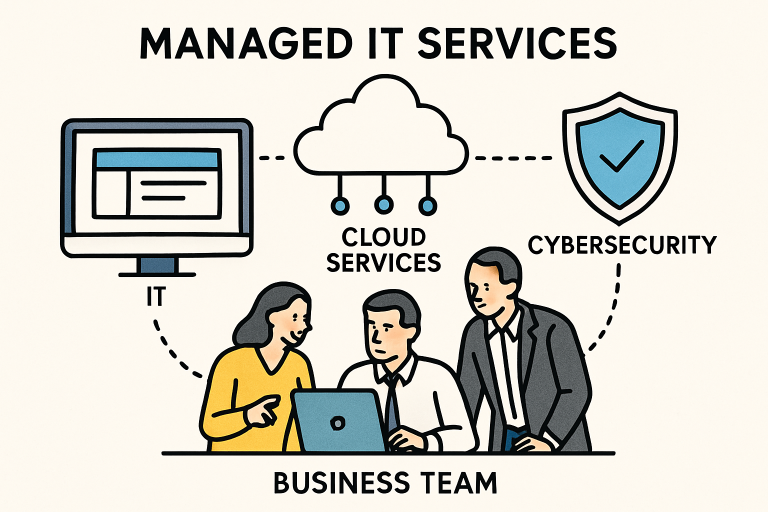Why Businesses Rely on Managed IT Services
The digital transformation across all industries has led to a significant increase in the complexity of technology in the workplace. Businesses are managing distributed workforces, juggling dozens of software applications, and defending against increasingly sophisticated cyber threats. For many, keeping up with these rapid changes is a challenge—especially when in-house IT resources are stretched thin or lack specialized expertise. This is why many organizations choose to partner with a trusted IT support company in Columbus OH, allowing them to access expert guidance and reliable support whenever it’s needed.
Managed IT services help companies grow by reducing technical burdens through proactive monitoring, boosting uptime, reliability, and productivity. As technology advances with cloud, AI, and remote work, having an IT partner ensures infrastructure keeps pace and improves cybersecurity through software and training. For organizations without an internal IT department, managed services offer skilled professionals and solutions at lower costs. They support scalability and agility, enabling businesses to seize opportunities without tech issues. Services include network monitoring, data backup, disaster recovery, help desk support, cybersecurity, and cloud management, with providers customizing solutions to meet individual needs. For example, healthcare must comply with HIPAA, and financial firms need secure platforms. Managed services simplify these tasks, offering tools and expertise to implement and manage them effectively.
Primary Advantages for Small and Midsize Enterprises
While enterprise IT budgets are large, small and midsize businesses (SMBs) often have limited resources. Managed IT services offer affordable, high-quality technology and 24/7 support, providing predictable monthly costs and minimizing unexpected expenses. SMBs also benefit from expert advice without the overhead of an in-house team, allowing leaders to focus on strategy. Many have experienced success, such as a local accounting firm enabling remote work during tax season or a medical practice enhancing data security through a provider.
Adapting to New Tech Trends: Remote Work and Hybrid Environments
The rise of remote work and hybrid office models has boosted the need for scalable, flexible, and secure IT solutions. Managed IT providers help companies deploy encrypted collaboration tools, secure virtual private networks (VPNs), and cloud-based productivity suites, enabling teams to work from anywhere. Security remains a top priority as employees operate outside traditional office boundaries. Managed services offer continuous threat monitoring, employee cybersecurity training, and real-time support, all of which help reduce the risk of data breaches and foster confidence in remote operations.
Business Continuity and Cybersecurity
Unplanned downtime can severely impact productivity and revenue. Managed IT companies offer continuity planning, including regular data backups, disaster recovery, and preventive maintenance. They monitor systems 24/7 to detect issues early. As cybersecurity threats grow, managed services protect against ransomware, phishing, and other risks, offering more than basic antivirus by securing every tech touchpoint.
How to Evaluate Managed IT Service Providers
Choosing the right IT partner shapes your future tech roadmap. Before selecting, ask about response times, security, scalability, and support. Ensure they have a clear process to align services with your priorities. Request references or case studies, clarify terms, and discuss system reviews. Transparent communication ensures IT solutions that grow with your business.
The Future of Managed IT Services
New technologies such as artificial intelligence, machine learning, and zero-trust security frameworks are reshaping the managed IT landscape. Service providers are evolving, offering advanced analytics, process automation, and deeper cybersecurity integration. As digital transformation accelerates, managed IT is increasingly seen as a foundational business partner—enabling innovation, agility, and resilience regardless of company size.
Looking ahead, managed services will continue to help organizations turn technology challenges into opportunities for growth, positioning them to thrive amid ongoing change.

